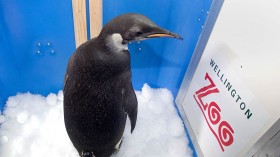46 "win-win" ideas for lowering human infectious disease burdens and achieving conservation goals were reviewed after a thorough evaluation of scholarly articles and reports.
These solutions may now be examined on a publicly accessible website.
The study identifies several, diversified areas of progress where there may be chances to concurrently protect ecological and human health.
The solution for reducing human illness while conserving the environment
 (Photo : Karsten Würth/Unsplash)
(Photo : Karsten Würth/Unsplash)

The study, which was published in The Lancet Planetary Health, involved over 30 researchers from all throughout the United States and abroad.
Academic researchers, professionals from governmental and nonprofit organizations, and veterinarians made up the multidisciplinary team, as per ScienceDaily.
The study's co-author and associate professor of applied ecology at NC State, Skylar Hopkins, said the interdisciplinary team spent four years developing this synthesis.
They diligently combed through the available academic literature for prospective solutions before creating a brand-new method for figuring out whether a certain "win-win" option is secure, workable, and economical.
They discovered that the ideas had varying degrees of success proof; some have significant backing already, while others are ready for more research.
Only one of the 46 remedies on the list has "strong" evidence for both beneficial effects on human health and conservation, and that is the vaccination of dogs to lessen the spread of rabies to both people and animals.
As disease reservoirs, household cats and dogs are emphasized in a few of the remedies.
Every time you vaccinate your dogs or raise your cat to be walked on a leash instead of running loose, you're implementing one of the 46 offered remedies, according to Hopkins.
Some of the solutions are carried out in enormous quantities by national or international governments.
The Science for Nature and People Partnership provided funding for the working group after several team members spent years researching human schistosomiasis in Africa, a crippling condition brought on by coming into touch with water tainted with parasites from snails.
When a river was blocked and prawns, which devour the snails, couldn't move, the snail population surged. The possible answer is bring back prawns to the river.
Uncertain of whether they would uncover many or few further instances of potential win-win solutions, the team set out to locate them.
With the exception of Antarctica, they discovered that the 46 probable solutions include six of the world's seven continents.
They also contain many of the most significant known diseases and routes of disease transmission around the globe.
Also Read: Experts Warn Exposure to Air Pollution Could Increase Risk of Severe Mental Illness
46 strategies that addressed the issue
The researchers next looked for further potential fixes for issues involving the interplay between human and ecological health, as per Anthropocene Magazine.
They discovered 46 solutions after searching the scholarly literature, they write in today's edition of The Lancet Planetary Health.
The diverse programs span six continents and include anything from efforts to eradicate invasive pythons in Florida to restrictions on the sale of meat from wild animals.
27 of the proposed remedies center on controlling certain animals.
They may also be disease-carrying animals, such as cats that are hosts to the parasite that causes toxoplasmosis.
Others rely on unintended consequences, such as the potential that increasing the number of leopards in an Indian national park might reduce the likelihood that people would contract rabies since the cats consume wild dogs that are infected with the illness.
Six of the solutions had conservation as a side benefit and began with the public health aspect of the problem. This covers both the Borneo health center and initiatives to prevent the spread of bird flu from wild birds to domestic poultry.
However, when the scientists looked more closely at several of these theories, they didn't uncover compelling proof that both humans and the ecosystem benefitted.
Sometimes the information was flimsy or incoherent.
Consider the prohibitions on the trade in wild meat, which various nations adopted as the virus spread. The scientists gave the data supporting environmental or health advantages a low rating.
In fact, they pointed out that restrictions imposed in Guinea and Sierra Leone in reaction to Ebola outbreaks had no long-term impact on commerce and instead drove customers to the illicit market.
The scientists discovered that the concept of shrimp reintroduction, which inspired this attempt, has limits as well.
A Senegal River experiment that added prawns to a closed-off area saw a reduction in snail populations and reinfection rates.
However, a modeling study revealed that under some circumstances, fewer snails can potentially increase the chance of infection.
Related article: 44% of Earth's Land in Need of Conservation To Protect Biological Diversity and Environmental Systems
© 2024 NatureWorldNews.com All rights reserved. Do not reproduce without permission.

![Climate Change is Reducing Dust Levels Worldwide as Arctic Temperature Warms [Study]](https://1471793142.rsc.cdn77.org/data/thumbs/full/70320/280/157/50/40/climate-change-is-reducing-dust-levels-worldwide-as-arctic-temperature-warms-study.jpg)
![Tsunami Hazard Zones: New US Map Shows Places at Risk of Flooding and Tsunamis Amid Rising Sea Levels [NOAA]](https://1471793142.rsc.cdn77.org/data/thumbs/full/70325/280/157/50/40/tsunami-hazard-zones-new-us-map-shows-places-at-risk-of-flooding-and-tsunamis-amid-rising-sea-levels-noaa.jpg)


